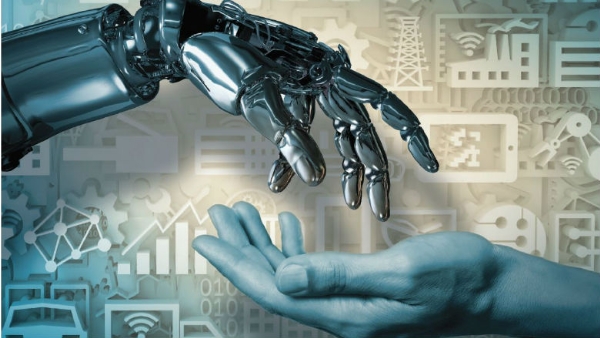Impact of Technology on Human Civilisation
Most adversely impacted by the technology ,perhaps, is the sociology of the present world.
Total Views | 193
The turning point of the world or in true words , the very human civilization, is the ‘industrial revolution’ which began to shake faiths, beliefs, governance and governments as well. Human efforts with the ongoing industrial changes widened the compass of human abilities in the field of knowledge and intelligence. Several secrets of the nature, hitherto hidden , unfolded and there appeared a sea change in every field of activity of progress, development and growth. There did not remain a single field in the life of the individual unaffected. The pace of the growth was such that before any individual , any society, or even the State could not cope up with the change . The sociology , the economics , the politics or even the commerce of the world underwent huge changes which brought about fine growth on the one hand and disastrous ends of several tasks on the other. Peace exploded into numerous layers of fear and thereby outburst of humanity for survival.

Encyclopaedia Britannica has explained the term technology as “ technology is the application of scientific knowledge to the practical aims of human life or, as it is sometimes phrased, to the change and manipulation of the human environment. There are 8 types social of technologies as following: 1, Artificial Intelligence. ..2) Information Technology. ...3. ) Space Technology. .4.) Entertainment Technology. ...5) Medical Technology. ..6) Operational Technology. ...7.) Assistive Technology. ...8 ) Communication Technology.
Each of the above has left behind an impressive mark on human life. All of the above or any one of the above has brought about an intricate change in the life style of the individual as well as the society .Similarly , in a research paper published in the Federal University of Technology, Nigeria technology is explained as follows :
“ it is maintained that for a technology to be appropriate, it must show the following features: (i) Simple and easy to understand (ii) Manageable (iii) Inexpensive (iv) Flexible (v) Adaptable to changing needs (vi) Technically feasible (vii) Locally serviceable (viii) Employment generation potential (ix) Infrastructural compatible and compatible with the people's cultural practices. Therefore, a technology well suited to one environment may not transfer well to another very different environment. Technology and Science.”
(Source: Research paper ---The roles of science and technology in national development ---authored by Anaeto, F.C. and others, Department of Agricultural Extension, Federal University of Technology, Owerrri, Nigeria )
If we trace the history of the Society and the individual during the medieval period in the recent past , we would realise that the life style of the people , looked backward compared with the present day. Their social customs , faith , beliefs , relationships, the social cohesion with which they lived, the military might these warriors ielded , the weaponry these warriors deployed in big battles were new for those days , but compared to the present days ,these are no where nearer to the present days. Emergence of the concepts from kingdoms to empires , super-powers , nuclear powers have brought about changes in the international maps , redrawn boundaries of several countries, fall of empires and governments , democracies weakened on account of ideological invasions and circumscribed States, emergence of dictatorships , emergence of military dictatorships , military Coues , all such matters are the manifestation and results of force and farces of political plays.
Most adversely impacted by the technology ,perhaps, is the sociology of the present world. The easy casualties were the institutions of marriage, relationships , family , even the motherhood , brotherhood, husbandship, , moreover concept of neighbourhood fell victim . Interestingly , even the world of crime too adopted modern and up to date technology to commit criminal episodes. Dacoits , murderers, looters , cheats and several other criminals learnt and used new techniques to commit various unlawful activities . The latest addition to this cluster is cyber -crimes.
Interestingly , the period of industrial revolution perhaps never expected the twist which the new powerful horizons of growth that had dawned in every sector would invite innumerable calamities. There were wars even before the industrial revolution, but the aftermath of the revolution , the imperial competition spread over much larger areas of the globe and these ended in far more disastrous outcome, the world cannot forget ‘Hiroshima’ and Nagasaki’. The world cannot forget the annihilation effected in the second world war which culminated in the death of quite a few million souls. Nobody could justify their massacres . These fought and died . They fought to die.
Industrial revolution caused a major shake up in the social structure. The most disastrous casualty was the institutions of marriage and family . Large sized industries , spread over large lands, required the families to split and the individual man or woman was forced to leave his or her family which were well settled in the rural areas . The process of migration and urbanisation was fast, the migrated individuals could not be accommodated in the middle class housing colonies which gave way to the ghettos, people without homes were required to spend their torturous daily routine in unhygienic conditions which naturally gave rise to several diseases and epidemics. The increasing losses in the field of environmental qualities and levels led to the failing projects and destabilised establishments . This was such a smooth process that no community could feel the heat that lay inside the womb which clandestinely moved ahead to explore the future.
The urban public administration required several services to satisfy the needs of the people. If the services fell short of the requirement, the subsequent agitations were inevitable. This vicious circle would keep going on in spite of technical support without any successful end in sight. In the process of urban development , innovation in several spheres of developmental activities along with architectural designs and civil plans, the technological participative coordination contributes to its success or failure. Road construction, water supply , electrification , building plan approvals, construction of public lavatories, toilets all need technological innovations and assistance. Technological assistance has become a major contributor in this regard.
A research paper : “The roles of science and technology in national development . Anaeto, F. C.* , Asiabaka, C. C., Ani, A. O., Nnadi, F. N., Ugwoke F. O., Asiabaka I. P., Anaeto, C. A. and Ihekeronye N. Department of Agricultural Extension, Federal University of Technology,P.M.B 1526, Owerri, Imo State, Nigeria.
*Corresponding Author Email: frankanaeto@yahoo.com. Received 3 October 2016; Accepted 28 November, 2016 Science and Technology hold the key to the progress and development of any nation.
“Technology plays a Fundamental role in wealth creation, improvement of the quality of life and real economic growth and transformation in any society.
“It is on recognition of the above that this paper examines the concept of technology emphasizing the relationship between Science and technology, the key role of science and technology in societal Development as well as the role/importance of science and technology in National Development.
“The paper went further to critically identify and examine the roles of science and technology in different Segments of life such as poverty alleviation, Health, Agriculture, affordable energy, water supply, environmental management, economic growth, rural development and Education.
“The paper thus observes that the gap between rich and poor countries can largely be attributed to the differences in Technology and the difficulty in their application.
“It recommends policy options for reaping benefits from science and technology in Nigeria which include among others that the educational system shall emphasize science at all levels and re-orient the entire society towards scientific thinking in order to develop new technologies and adapt existing ones to improve the societal well being.
“Finally, considering the roles of science and technology in national development, it is imperative to stimulate demand for technology from both private and public sectors.”
Thus, it could be seen that technology has been a key instrument in bringing about national development.
The application of all these techniques for the development of family and the society , the nation as well as has been responsible for the rapid growth of the national and international community. It is interesting to note the thematic conclusion arrived at by a research Team in a University referred to above which states :
“No doubt, science and technology hold the key to the present and future development of any nation including Nigeria. Technology is achieved through a combination of knowledge, methods, tools and skills. This four-element definition of technology offers the details and clarity required for technology enhancement planning that must necessarily include knowledge and skills upgrade (training) and acquisition of human elements (knowledge and skills) and the tangible elements (methods and tools) of technology form the basis for our thinking and working processes. We must ensure adequate development of man power in science and technology to guarantee the efficient utilization of abundant natural resources and reduce the drain on our treasury and independence on outside sources for industrialization. The nation should be technologically self-reliant in the production of capital and consumer goods and raw materials.
The educational system shall emphasize science at all levels and re-orient Direct Res. J. Soc. Sci. Edu. Study 42 the entire society towards scientific thinking in order to develop new technologies and adapt existing ones to improve societal well being and security. Technology based developments can occur only with concerted efforts to revitalize education, develop personnel and create integrated industries that will involve close collaboration between government, industry and academia. Considering the roles of science and technology in national development, it become important to stimulate demand for technology from private sector, renew emphasis on the creation of linkages between firms and knowledge institutions, reform enabling environments for better use of knowledge, setting priority and evaluation right, promoting transparency, objectivity, selectivity and international best practices in science and technology funding, increasing access to ICTs and Government as a consumer of knowledge.
(Source : Ibid)
The above mentioned conclusive observations are made in the context of an African country like Nigeria ,it is also applicable to India.
Conclusion : In view of the above narration ,it seems that since the advent of “industrial revolution” ,the technology has been on the expansion mode and consequently its impact has been on its rampage and has affected several dimensions of the life style of the individual as well as the society at large. Technology has brought under its fold the international arena. This has resulted in multifarious effects which has brought about an unprecedented growth of the infrastructure of the service and production sectors enabling the human civilisation reach the highest level of comfort and satisfaction. One has also to take into account that since the industrial revolution ,the human civilisation has witnessed several wars , exodus, migrations, shifting of huge populations from one place to far off places, huge famines and famine stricken vast portions on the globe, epidemics like ‘plague’ , ‘karona’ widely spread on large portions of the world which caused the deaths of millions , all these calamities were overcome with the help of technology and its application to recover the losses and further recover from the losses rebuild the future.
“An underlying thread in yesterday’s post on persistent chat rooms is that technology and culture influence each other. We usually tell the story that culture creates a technology, because that explanation seems the most natural way to understand our history and it puts our choices at the forefront, but we also have to consider the ways in which technology either influences or creates culture. The technology that powered the industrial revolution created the industrial society. The mass production of automobiles created a culture of commuters, vacationers, and the suburbs. Radio created a culture of listeners and spawned jazz, big band, and fireside chats. Television created the culture of Hollywood, MTV, always-on news, and reality TV shows. The Internet is creating a culture that’s changing so fast that I’m afraid to give examples that may be dated by the time you read this.
“As much as technology is created from the fabric of our culture, technology also creates the fabric of our culture. If we follow this thread to its extension, technology creates itself. It’s this awareness that technology is creating itself that makes movies like The Terminator or Marvel’s Avengers: Age of Ultron work. Truth is indeed stranger than fiction.
“Because technologists or historians are often leading the discussion on how technology creates culture, there tends to be this sense of abstractness or extremeness to it. There’s a jump from, say, cars to suburbia. Yes, I did it above, because those extremes are helpful to see. But I believe those big jumps also make the discussion seem less personal to us, because they’re the story of large social changes that we’re reacting to, rather than actively reinforcing or co-creating with others.”
( By Charlie Gilkey , a columnist ,other details not known , I am grateful to Charlie )
“Technology and culture are two forces that greatly influence one another. As new technology is introduced into a society, the culture reacts in a positive or negative way and is thus changed forever. Consequently, as cultures change so does the technology they develop. “Anthropologists have noted that culture consists of all learned beliefs and behaviors, the rules by which we order our lives, and the meanings that human beings construct to interpret their universes and their place in them” (Robbins, 2008). The technology created to make life better often has negative effects on cultures even if it initially appears to provide benefits. Ultimately, advances in technology directly affect how cultures evolve; thus, when cultures evolve, they tend to create”
( The Encyclopedia of North American Architecture. Stevenage, Hertfordshire, UK: Chartwell
Books, Inc.)
Technology sows the seeds of development , grows it and reaps the fruits of development. However, one thing has emerged , many scientists have realised that development is more concerned with economic development. But it lacks emotions and culture. It is like a robo.
It is because, once the onslaught of technology moves ahead cutting into the future, there is no come back. Aberration is inevitable. Human civilisation in India seems to have taken much care to retain the ethos of Indian cultural soul .It is this spiritualism has enabled India i.e. Bharat to remain as it is along with its not so modern or UpToDate family, marriage , social institutions against all odds.
Bharati Web








